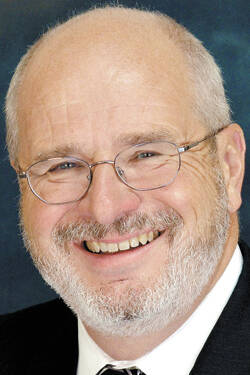They gather on a gorgeous late summer day to recall a man who embodied all they believed in and a moment in time when his virtues could shape history.
The crowd gathered for the unveiling of a statue honoring the late U.S. Sen. Richard Lugar, R-Indiana, contains many people of prominence.
A former vice president of the United States. A former U.S. secretary of state. Former U.S. senators. Mayors of Indianapolis, current and past. Dignitaries from other walks of life.
Republicans.
Democrats.
Independents.
They came together to pay tribute to Lugar, the leader who, as mayor, transformed Indianapolis from a sleepy backwater into a regional powerhouse and who, as senator, made the world a safer place by preventing nuclear weapons from falling into the hands of terrorists and renegade nations.
The tributes focus on Lugar’s sagacity and statesmanship, his keen ability to see possibilities to which others were blind and to unravel knots that seemed unyielding to anyone’s touch but his. They talk of his talent for bringing people together, then keeping them at the table until they all had solved a problem.
The tone of their remarks is wistful, part elegy, part rebuke.
Unspoken but unmistakable is an undertone of mystification—of wondering how we got from Lugar’s era to this snarling, snappish current one.
How we moved so quickly from a time when a man of Lugar’s unflagging and unfailing civility and courtesy could serve as a—and often “the”—moral leader of the GOP to a period in which the dominant figure in the party to which Lugar devoted his life cozies up to murderous dictators and autocrats and vilifies his fellow citizens.
The question, unposed but ever-present, hovers over the proceedings, like a ghost that can find no peace.
Former Secretary of State Condoleezza Rice comes closest to addressing the mystery in her elegant and eloquent address.
She says Lugar was so effective because he was “trusted.” That’s because he was “trustworthy.”
This is true, but it only goes halfway toward explaining Lugar’s rare gift for getting things done.
Lugar not only was trusted and trustworthy, but he also had the capacity to trust others, even those with whom he disagreed. A man of reserved demeanor, his seemingly placid exterior concealed an eye and mind that missed little.
He read people the way scholars read books, knowing how he could build the rapport necessary to form partnerships that could make history happen.
Former U.S. Sen. Sam Nunn, D-Georgia, worked with Lugar to pry weapons of mass destruction out of the hands of recalcitrant Russian hands after the Cold War ended. At the time, Russia was on the edge of economic collapse, so the prospect of selling nukes to rogue nations to generate needed cash was attractive to Russian leaders at the time—and the notion of surrendering them, on whatever terms, to the Americans with whom they’d been jousting for decades was not.
Lugar and Nunn negotiated through those tensions to work magic. Their work reducing nuclear proliferation saved lives and should have won them a Nobel Peace Prize.
Their partnership worked not just because Nunn trusted Lugar, but because Lugar had the wisdom and judgment to trust Nunn.
Nor was this an isolated incident.
Former U.S. Sen. Joe Donnelly, D-Indiana, once told me of how Lugar mentored him when Donnelly was a member of the U.S. House of Representatives. There was no partisan political benefit for Lugar in helping a rising star in the other party, but, once again, Lugar had read the man before him and recognized Donnelly as a kindred spirit.
Once in the U.S. Senate, occupying the seat Lugar held for 36 years, Donnelly did a better job of approximating his mentor’s traits of civility and bipartisanship than many of Lugar’s fellow Republicans did.
At the ceremony’s end, Lugar’s widow and sons unveil the statue of the senator.
It is a fair likeness of the man, unprepossessing but forthright, a depiction of a leader who accomplished great things not through lofty rhetoric and flashy gestures but by working hard and knowing more than the next guy.
People cluster around the metal sculpture, many of them people inspired to pursue careers in public service by Lugar’s example.
They see the senator’s statue as a symbol of what we have lost.
And maybe, just maybe, a beacon by which we can steer our way back.
John Krull is director of Franklin College’s Pulliam School of Journalism and publisher of TheStatehouseFile.com, a news website powered by Franklin College journalism students. The views expressed are those of the author only and should not be attributed to Franklin College. Send comments to [email protected].





